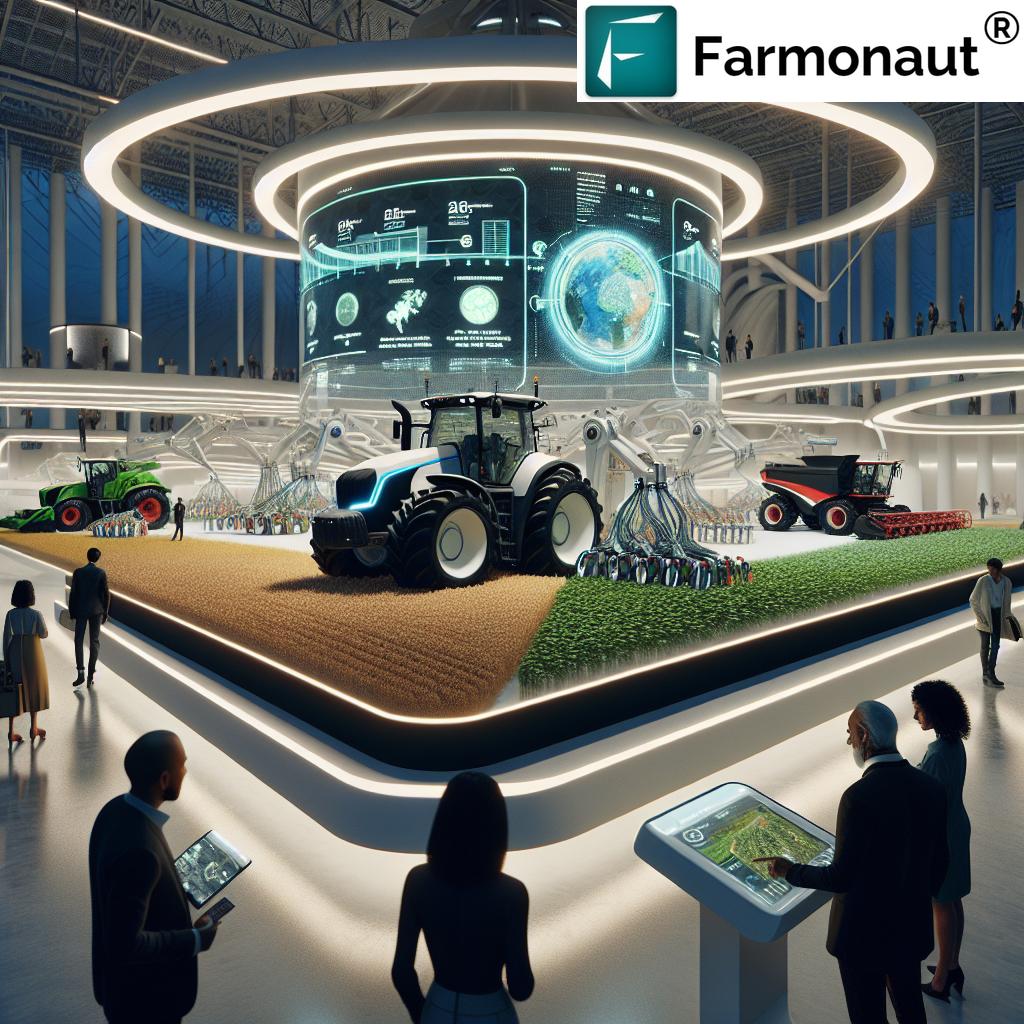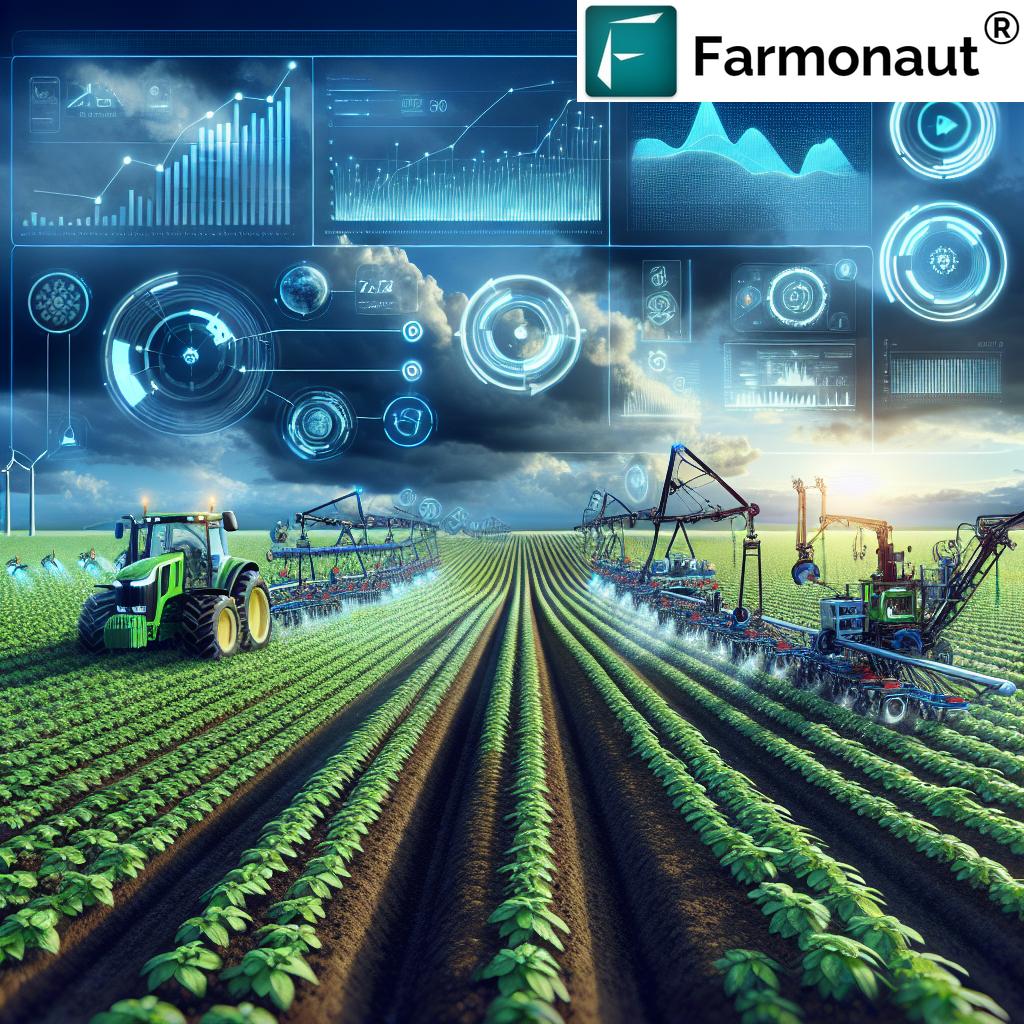Innovative AgTech Solutions at EIMA Bologna: Empowering Farmers to Combat Climate Change with Precision Agriculture
“At a recent international agricultural exhibition, experts showcased over 50 cutting-edge agricultural machinery models to combat climate change effects.”
Climate change is reshaping the landscape of agriculture, presenting unprecedented challenges to farmers worldwide. As we navigate this new era, the agricultural sector finds itself at a critical juncture, where innovative farming technologies are becoming the cornerstone of adaptation strategies. The recent 46th annual EIMA International Exhibition held in Bologna, Italy, served as a beacon of hope, showcasing groundbreaking agtech solutions that promise to revolutionize how we approach farming in the face of environmental uncertainties.
In this comprehensive exploration, we’ll delve into the cutting-edge technologies and strategies presented at EIMA Bologna, examining how they’re set to empower farmers in their battle against climate change. From precision agriculture techniques to digital farming technologies, we’ll uncover the tools that are paving the way for a more resilient and sustainable agricultural future.
The Climate Crisis: Agriculture’s Greatest Challenge
As highlighted by Prof. Luigi Sartori from the University of Padua at the EIMA forum, agriculture stands as the primary victim of climate change. The sector’s heavy reliance on outdoor activities makes it particularly vulnerable to the increasing frequency and severity of extreme weather events. Let’s break down the key challenges:
- Soil Erosion and Degradation: Severe rainfall events are leading to unprecedented levels of soil erosion, stripping away fertile topsoil and reducing land productivity.
- Carbon Release: The decomposition of organic matter in soil contributes to the release of carbon dioxide, further exacerbating the climate crisis.
- Resource Scarcity: Changing precipitation patterns and rising temperatures are putting strain on water resources, necessitating more efficient irrigation methods.
- Crop Vulnerability: Traditional crop varieties are struggling to adapt to new climate conditions, threatening food security on a global scale.
These challenges underscore the urgent need for innovative solutions that can help agriculture not only survive but thrive in changing environmental conditions.
Precision Agriculture: The Vanguard of Climate Adaptation
At the heart of the agricultural revolution showcased at EIMA Bologna was precision agriculture. This approach leverages cutting-edge technologies to optimize resource use, enhance crop resilience, and mitigate environmental impact. Here’s how precision agriculture is transforming farming practices:
- Satellite-Based Crop Monitoring: Advanced satellite imagery allows farmers to track crop health in real-time, enabling early detection of issues and more targeted interventions.
- AI-Driven Advisory Systems: Artificial intelligence algorithms analyze vast amounts of data to provide personalized recommendations for crop management, optimizing yields while minimizing resource use.
- Smart Irrigation Systems: Precision irrigation technologies use sensor data and weather forecasts to deliver water exactly where and when it’s needed, significantly reducing water waste.
- Variable Rate Technology (VRT): This allows for the precise application of inputs like fertilizers and pesticides based on specific field conditions, reducing overuse and environmental impact.
These technologies not only help farmers adapt to climate change but also contribute to mitigation efforts by reducing the overall environmental footprint of agricultural activities.

Conservation Agriculture: Preserving Soil and Resources
Conservation agriculture emerged as a key theme at EIMA Bologna, with experts emphasizing its role in preserving soil structure and fertility. This approach encompasses several key practices:
- Minimum Tillage: Reducing soil disturbance helps maintain soil structure and organic matter content, enhancing water retention and reducing erosion.
- Crop Rotation: Diversifying crops over time improves soil health, breaks pest cycles, and enhances overall farm resilience.
- Cover Cropping: Planting cover crops during off-seasons protects soil from erosion, improves soil fertility, and captures carbon.
- Precision Nutrient Management: Using soil testing and precision application technologies to optimize fertilizer use, reducing waste and environmental impact.
These conservation strategies work in tandem with precision agriculture techniques to create a more sustainable and climate-resilient farming system.
Digital Farming Technologies: The Future of Agriculture
The digital revolution in agriculture was on full display at EIMA Bologna, with a range of technologies poised to transform farm management:
- IoT Sensors: Networks of sensors provide real-time data on soil moisture, temperature, and other critical parameters, enabling more informed decision-making.
- Drone Technology: Drones equipped with multispectral cameras offer high-resolution imagery for crop monitoring and precise application of inputs.
- Blockchain for Traceability: Blockchain technology is being leveraged to enhance supply chain transparency and food safety.
- Big Data Analytics: Advanced analytics tools help farmers make sense of the vast amounts of data generated by digital farming systems, turning information into actionable insights.
These digital tools are not just enhancing productivity; they’re also playing a crucial role in improving the environmental sustainability of agriculture.
Innovative Agricultural Machinery: Powering the Future of Farming
EIMA Bologna showcased an impressive array of advanced agricultural machinery designed to meet the challenges of modern farming:
- Smart Tractors: Equipped with GPS guidance systems and auto-steering capabilities, these tractors optimize field operations and reduce soil compaction.
- Precision Seeders: These machines ensure optimal seed placement and spacing, improving crop establishment and resource use efficiency.
- Intelligent Sprayers: Advanced spraying systems use sensors and AI to target applications, reducing pesticide use and environmental impact.
- Robotic Harvesters: Autonomous harvesting machines are revolutionizing crop collection, improving efficiency and reducing labor costs.
These innovative machines are at the forefront of agricultural mechanization trends, offering solutions that combine productivity with sustainability.
“Genetic improvement research has developed more than 100 climate-resistant crop varieties to enhance food security in changing environments.”
Climate-Resistant Crop Varieties: Breeding for Resilience
A significant focus at EIMA Bologna was on the development of climate-resistant crop varieties through genetic improvement. This research is crucial for adapting agriculture to changing environmental conditions:
- Drought-Tolerant Crops: Varieties that can withstand longer periods without water, crucial in regions experiencing increased aridity.
- Heat-Resistant Plants: Crops bred to tolerate higher temperatures, maintaining productivity in warming climates.
- Pest and Disease Resistance: Varieties with enhanced resistance to emerging pests and diseases associated with climate change.
- Salinity Tolerance: Crops that can grow in soils with higher salt content, addressing issues of soil salinization.
These advancements in crop genetics are essential for ensuring food security in the face of climate uncertainties.

The Role of AI and Robotics in Climate-Smart Agriculture
Artificial Intelligence (AI) and robotics were prominent features at EIMA Bologna, showcasing their potential to revolutionize farming practices:
- AI-Powered Decision Support: Machine learning algorithms analyze vast datasets to provide farmers with actionable insights for crop management.
- Autonomous Robots: From weeding to harvesting, robots are performing increasingly complex tasks, reducing labor needs and improving precision.
- Predictive Analytics: AI models help forecast weather patterns, pest outbreaks, and crop yields, enabling proactive management strategies.
- Computer Vision: Advanced image recognition technologies aid in early detection of crop diseases and precise application of treatments.
These technologies are not just improving efficiency; they’re enabling a level of precision in agriculture that was previously unimaginable, helping farmers adapt to and mitigate the effects of climate change.
Sustainable Agricultural Practices: A Holistic Approach
EIMA Bologna emphasized the importance of integrating various sustainable practices to create resilient agricultural systems:
- Agroforestry: Integrating trees into agricultural landscapes to improve soil health, increase biodiversity, and sequester carbon.
- Regenerative Agriculture: Practices that focus on rebuilding organic soil matter and restoring degraded soil biodiversity.
- Integrated Pest Management (IPM): Holistic approaches to pest control that minimize chemical inputs and promote ecosystem balance.
- Water Conservation Techniques: From rainwater harvesting to deficit irrigation, innovative approaches to water management were highlighted.
These practices demonstrate that sustainability in agriculture goes beyond technology, encompassing a range of ecological and management strategies.
The Economic Landscape: Market Trends and Mechanization Demand
Simona Rapastella, General Manager of FederUnacoma, provided insights into the economic aspects of agricultural innovation:
- Global Market Dynamics: Analysis of agricultural machinery demand across different regions, from established markets in Europe and America to emerging ones in Asia and Africa.
- Investment Trends: Recognition of the need for innovation is driving planned investments in agricultural technology.
- Mechanization Growth: Increasing demand for agricultural machinery, reflecting the sector’s move towards more technologically advanced farming methods.
- Economic Resilience: The agricultural sector’s ability to adapt and invest, even in challenging economic times, underscores its fundamental importance.
These economic insights highlight the global momentum behind agricultural innovation and mechanization.
Climate Change Challenges and AgTech Solutions
| Climate Change Challenges | AgTech Solutions |
|---|---|
| Soil Erosion | Precision Agriculture Techniques (e.g., Minimum Tillage, Contour Farming) |
| Water Scarcity | Smart Irrigation Systems and Drought-Tolerant Crop Varieties |
| Extreme Weather Events | Climate-Resistant Crop Varieties and Weather Prediction AI |
| Resource Inefficiency | AI and Robotics for Optimization of Input Use |
| Declining Soil Fertility | Digital Soil Mapping and Precision Nutrient Management |
| Increased Pest Pressure | IoT-Based Early Warning Systems and Integrated Pest Management |
| Carbon Emissions | Carbon Sequestration Practices and Renewable Energy Integration |
The Road Ahead: Integrating Solutions for a Sustainable Future
As we reflect on the innovations showcased at EIMA Bologna, it’s clear that the future of agriculture lies in the integration of these diverse technologies and practices. The challenge now is to make these solutions accessible and applicable to farmers across different scales and regions.
We at Farmonaut are committed to contributing to this agricultural revolution. Our satellite-based farm management solutions offer farmers affordable access to precision agriculture technologies, helping them navigate the challenges of climate change while optimizing their operations.
Explore Farmonaut’s innovative solutions:
For developers interested in integrating our technology into their own solutions, we offer a robust API. Detailed information can be found in our API Developer Docs.
Conclusion: Embracing Innovation for a Resilient Agricultural Future
The innovations showcased at EIMA Bologna represent a paradigm shift in agriculture, offering hope and practical solutions in the face of climate change. From precision agriculture and conservation strategies to climate-resistant crop varieties and AI-driven decision support, the tools are now available to transform farming practices.
As we move forward, the key to success will be the widespread adoption and integration of these technologies and practices. It will require collaboration between farmers, technologists, researchers, and policymakers to create an agricultural system that is not only productive but also resilient and sustainable.
The challenges posed by climate change are significant, but so too are the opportunities for innovation and improvement. By embracing these new technologies and approaches, we can build an agricultural sector that not only survives in the face of environmental change but thrives, ensuring food security and environmental sustainability for generations to come.
FAQs
- What is precision agriculture?
Precision agriculture is an approach that uses technology to optimize crop yields and resource use by tailoring farming practices to specific field conditions. - How does climate change affect agriculture?
Climate change impacts agriculture through increased extreme weather events, changes in precipitation patterns, rising temperatures, and shifts in pest and disease pressures. - What are some examples of AgTech solutions for climate adaptation?
Examples include smart irrigation systems, AI-driven crop monitoring, climate-resistant crop varieties, and precision application of inputs using IoT and robotics. - How can satellite technology help farmers?
Satellite technology provides farmers with real-time data on crop health, soil moisture, and weather patterns, enabling more informed decision-making and resource management. - What role does AI play in modern agriculture?
AI in agriculture helps in predictive analytics, automated decision-making, pest and disease detection, and optimizing resource use through data analysis.






